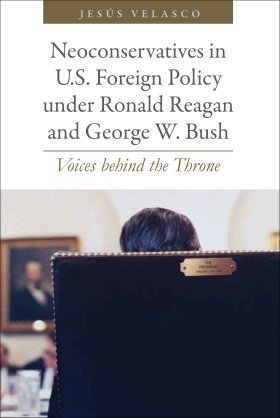Neoconservatives in U.S. Foreign Policy under Ronald Reagan and George W. Bush: Voices behind the Throne

-
Jesús Velasco examines the origins and history of the neoconservative political movement so closely identified with the George W. Bush administration’s policies of regime change and democratization. Analyzing the movement’s intellectual background, institutions, financial supporters, publications, and points of influence, Velasco distinguishes the first generation of neoconservatives, which emerged in the late 1970s, from the generation that rose to power in the 2000s. Velasco’s study is based in large part on interviews with such key neoconservative figures as Irving Kristol and Richard Perle and on access to the archives of such organizations as the Committee on the Present Danger and the Coalition for a Democratic Majority. This work provides important new insights into how this cadre of intellectuals—once on the margins of the political scene—came so dominantly to affect U.S. foreign relations.
Jesús Velasco currently holds the Joe and Teresa Long Endowed Chair in Social Sciences at Tarleton State University. He worked for many years at the Center for Teaching and Research in Economics (CIDE) in Mexico City. He was a Public Policy Scholar at the Woodrow Wilson Center in 2004 and a visiting scholar at the Weatherhead Center and the Rockefeller Center for Latin American Studies, both at Harvard university.
Author
Browse Insights & AnalysisExplore More
Browse Insights & Analysis
Promoting Convergence in US-Brazil Relations
Posted date/time:
360° View of How Southeast Asia Can Attract More FDI in Chips and AI
Posted date/time:
Israel Escalates Attacks in Gaza: What’s Next?
Duration:21:00Posted date/time:
Trump Quietly Ups US Engagement With the Taliban
Posted date/time:Source: Foreign Policy